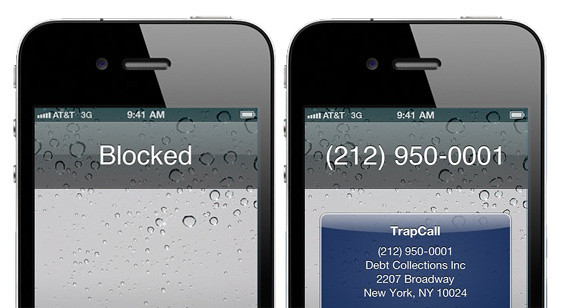
After what might very well be the longest delay between an app submission and its appearance on iTunes, Apple last week finally approved the TrapCall app by Tel Tech Systems after an astounding 201 days in review.
TrapCall is a nifty little utility app for the iPhone that lets users unmask phone numbers that initially show up on your caller-id as blocked or unknown. The app is free to download but requires a minimum $4.95/month TrapCall service fee if you actually want to use it.
Here’s how it all works. You receive a call from a masked number. You don’t answer and instead press the power button twice in quick succession. And then, wallah!, the service then sends you back a text message containing the number of the call along with the name and address associated with said number.
Now Apple’s handling of app store submissions has been subject to immense criticism ever since the app store opened up for business in July of 2008. Indeed, one of the more common complaints levied at Apple was that it would often let certain app submissions linger in the ether for what seemed like an eternity to anxious developers. Apple has largely come around and become more transparent in the way it operates the iTunes App Store – which of course begs the question – what the hell was the 201 day holdup all about?
Well you’ll be glad to know that the app reviewers at Apple aren’t having a relapse or anything, but rather wanted to make sure that TrapCall itself was even legal. 9to5Mac reached out to Tel Tech who explained why the app is, in fact, legal.
The “push the power button twice to reject the call” thing sort of makes it sound like we are doing something with the hardware that we’re not supposed to, but this is really just the easiest way to tell users that they have to ignore or reject the calls for their conditional call-forwarding to send the call to our 800 number for unmasking.
The service is actually 100% percent legal as we’ve even dealt with the FCC on this. The reason the app is legal is because the way the service works is that missed and rejected calls get forwarded to an 800 number for unmasking. The FCC has made it clear that because the owner of an 800 number has to pay for every incoming call to their number, that they’re entitled to see who is calling them – even if the caller ID is blocked.
So our users are essentially leasing a toll-free number from us which entitles them to the call information. We had to have our lawyers detail this info and send it to Apple….once they finally got back to us after 3+ months in review.
Some of the apps other features include the ability to blacklist unwanted numbers. The app description reads, “Blacklisted numbers will be played a phone company recording telling them your phone number has been disconnected.” Some nice trickery at work, here.
Also included is the ability to have voicemails transcribed and sent back to you as a text or push notification, the ability to receive missed calls even while your phone is off, and the ability for full-fledged caller ID – we’re talking full name and address information.
Are you running from creditors? Then check out TrapCall here on iTunes.
But before you do that, check out this sorta funny ad for TrapCall.





Tue, Apr 5, 2011
Legal, News